As the owner of an adorable guinea pig, you must be willing to feed them with a variety of foods. Besides feeding your guinea pig with hay, pellets, veggies, fruits, and clean water, you can also feed them with herbal plants.
So, can guinea pigs eat cilantro? Cilantro is a very nutritious herb that can be eaten by your guinea pig. They will certainly enjoy munching on the leaves. Cilantro or coriander is confirmed by many vets to be one of the safest herbs that guinea pigs can consume. Aside from being safe, they also have a balanced level of nutritional value.
In this article, we will provide you with information about the benefits and risks of feeding your guinea pig with cilantro and its nutritional value. Read on to learn more.
Table of Content
Is Cilantro Good for Guinea Pigs? | Health Benefits
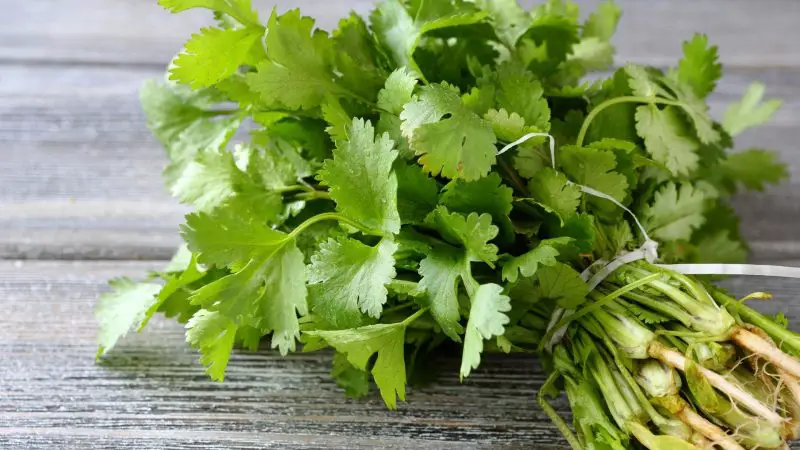
Your guinea pigs can gain a lot of things from the nutrients contained in cilantro.
Antioxidants
Most especially, they contain a large number of powerful antioxidants that can help in promoting the general health of your guinea pig. These antioxidants can also help in keeping the heart condition of your cavy in check.
Vitamin C
Like we already know, guinea pigs cannot manufacture one of the most essential nutrients in the body, vitamin C. This is one of the unique qualities they share with humans.
Vitamin C can strengthen your guinea pig and protect them from diseases. The downside, however, is that the Vitamin C content in coriander is low. Your cavies can still benefit a great deal from this green plant. After all, they only need it in minimal quantities.
Fat, Protein and Carbohydrates
The macronutrients in cilantro are fat, protein and carbohydrates. These are essential nutrients that your piggy needs to grow well. It is extremely low in fat, so your piggy doesn’t run the risk of going obese. It also contains a considerable level of carbohydrates and protein.
Dietary Fiber
This herb is very high in dietary fiber. Fibers are also important for your guinea pig as they work in regulating the cholesterol level in the body.
Vitamin K and A
Vitamins K and A are the major constituents of this plant. The vitamins are important in strengthening the bones of your piggy. They sharpen their sight and are extremely important for them during pregnancy time. They also boost the immune system and protect your guinea pig’s body from extreme toxicity.
Manganese
Cilantro contains manganese that improves their metabolic system. This makes their bones strong and helps them absorb calcium with ease.
Detoxification of Several Toxic Substances
Another very interesting benefit of cilantro is that it can help your guinea pig’s body detoxify various harmful substances.
Studies conducted to confirm that cilantro can be used to manage diabetes, and also to keep blood sugar levels down. Cilantro could also be used to prevent food poisoning. You can add a small quantity to their food every time to be on the safe side.
Nutrition Facts of Cilantro for Guinea Pigs
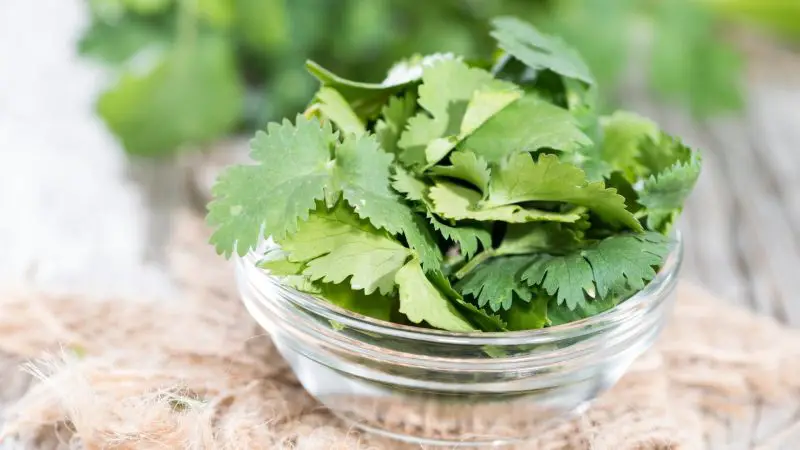
The following nutrients make up the contents of the cilantro leaves (amount per 100 grams):
- Energy – 23 kcal
- Protein – 2.13 g
- Total lipid (fat) – 0.52 g
- Carbs – 3.67 g
- Dietary Fiber – 2.8 g
- Sugars – 0.87 g
- Calcium – 67 mg
- Iron – 1.77 mg
- Magnesium – 26 mg
- Phosphorus – 48 mg
- Potassium – 521 mg
- Sodium – 46 mg
- Vitamin C – 27 mg
- Vitamin B-6 – 0.149 mg
- Vitamin A – 337 µg
- Vitamin E – 2.5 mg
- Vitamin K – 310 µg
- Carotene, beta – 3930 µg
- Folate – 62 µg
- Lutein + zeaxanthin – 865 µg
Is Cilantro Bad for Guinea Pigs? | Possible Risks
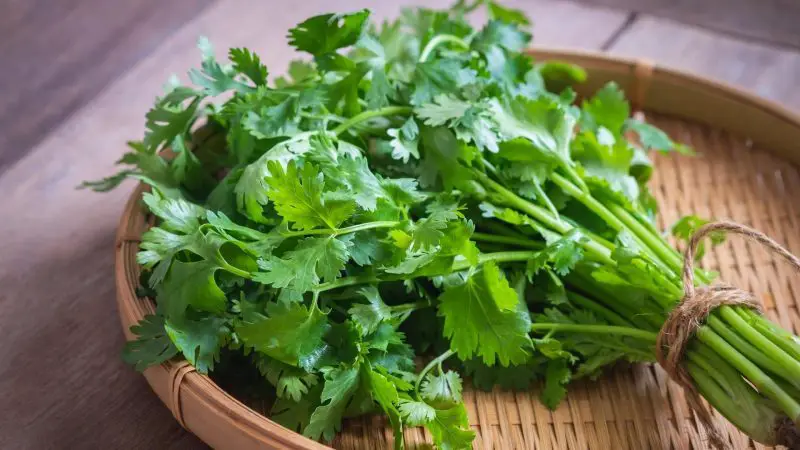
Coriander can also have negative effects, but only when overly fed to your guinea pig. It can cause indigestion, diarrhea, and dehydration.
Pregnant Guinea Pigs Are at Risk
To be on the safe side, avoid feeding coriander to your pregnant piggy. Cilantro can also slow down clotting and increase the risk of bleeding in your piggy when served heavily to them.
Damage Liver and Respiratory Problems
Too much coriander can take a toll on your piggy and damage its liver even if it contains essential antioxidants that can help safeguard the body from toxins. Too much of it can also drastically lower the blood pressure of your piggy. Another side effect is respiratory problems in your piggy, which can eventually lead to chronic asthma.
Skin Problems
Other negative skin reactions to coriander include rashes, irritation, itching, swelling, hives, and so on.
Serving Size and Frequency of Cilantro for Guinea Pigs
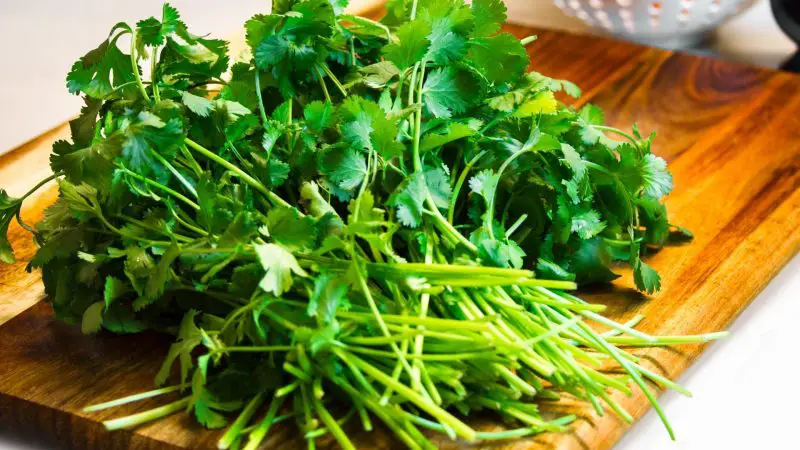
How Much Cilantro Should a Guinea Pig Eat?
A guinea pig’s daily diet is made up of around one cup of green leafy vegetables. Because our guinea pigs have a smaller stomach and poor digestion, feed them in little amounts. Thus, only a little portion of cilantro should be given to guinea pigs.
Adult guinea pigs can usually consume 10-20 tiny sprigs of cilantro, whereas a young guinea pig can consume nothing at all. When you first give cilantro to them, keep a 12-hour watch on them. Remove cilantro from your diet if you see any indications of uneasiness or diarrhea.
How Often Can Guinea Pigs Eat Cilantro?
This herb is popular with guinea pigs. Because they like chewing on the leaves, the majority of them respond positively. Your guinea pigs can eat cilantro almost every day. Remember to just use a little bit of it. hu ty
Nonetheless, if you’re introducing it for the first time, some of them may have an adverse response. Remember to check on their reaction when you’re introducing anything new to them.
More Information About Guinea Pigs and Cilantro
Can Guinea Pigs Eat Cilantro Stems?
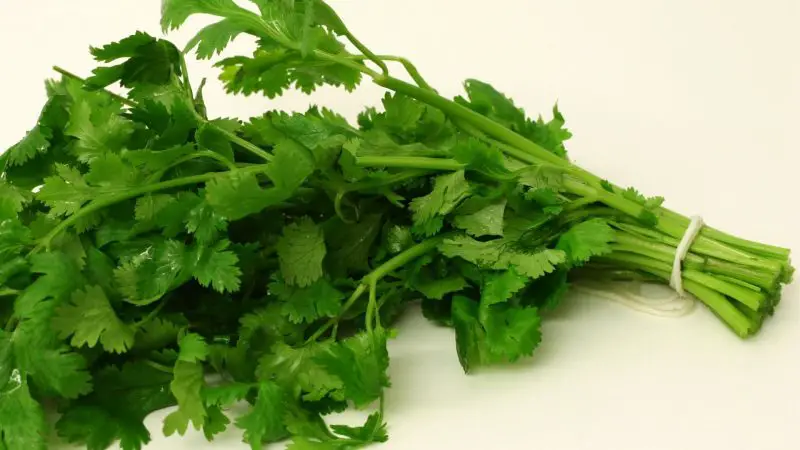
Cilantro stems are completely safe for guinea pigs to eat. Even better, our tiny pet enjoys having something in his or her mouth at all times. Before serving cilantro to the guinea pig, make sure it’s thoroughly washed.
The stems, like the leafy parts, are harmless. Because some cilantro stems have harsh surfaces, slice them into little pieces whenever you feed them to a guinea pig. This allows them to focus on it more easily.
Can Guinea Pigs Eat Cilantro Flowers?
Cilantro flowers can be consumed. Thus, you may add it to your guinea pig’s food with assurance. The flowering parts of cilantro are more appealing than the rest of the plant. Feeding cilantro flowers to a guinea pig has no negative consequences.
After you’ve washed the cilantro, feed it to them. Because they have a small stomach, please don’t offer them a huge chunk. It might induce diarrhea if they eat too much of it.
Can Guinea Pigs Eat Cilantro Roots?
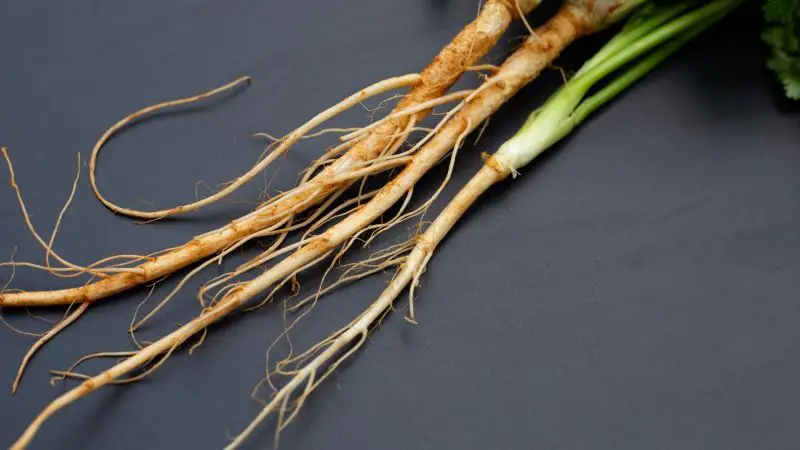
Guinea pigs cannot eat cilantro roots. Always keep the root portion separate because it provides no advantage to your guinea pigs.
Quick Facts on Cilantro
These are some of the interesting facts about cilantro which you will enjoy:
- Cilantro has been confirmed by historians to be one of the most commonly consumed herbs in the entire world. It is a very versatile plant that is usually used for cooking in different parts of the world, including North Africa, China, Caribbean, Mexico, and Eastern Europe.
- The entire plant of Coriander is edible, from the stem to the leaves to the roots and seeds, and also, highly nutritious.
- Coriander is also as old as the history itself, over 2,000 years ago, since the times of the Bible. The herb was discovered to be famous among ancient Hebrews and usually used in their popular passover meal.
- Cilantro is also popularly referred to as coriander or Chinese parsley. A herb of the Apiaceae family that is grown annually. Actually, the leaves are called cilantro, and the seeds are called coriander.
- This green herb can also be used in the production of creams and soaps. It has a very good herbaceous or lime-like aroma.
- Coriander is very delicate. So to store them, you will have to wrap it in a paper towel or a plastic bag and put in the refrigerator before use.
- A bed bug exists that emits almost the same smell as the coriander.
- Cilantro is best grown in dense, damp or humid areas.
- Cilantro is widely cultivated in Asia, India, Latin America, and North America.
We have also made a full list of foods that guinea pigs can and can’t eat (150+ Types of Foods). Be sure to also check our recommended products page for everything you will ever need to assure a happy life for your guinea pigs. Hope this information was helpful and you have found the answer you were looking for.
List of Sources
Cilantro / Coriander, Coriandrum Sativum
Vitamin C Requirements of the Guinea-Pig
Dietary Requirements of the Guinea Pig With Reference to the Need for a Special Factor
